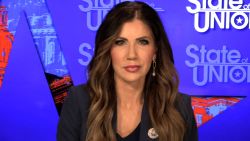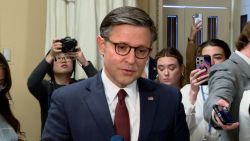Republican senators are increasingly concerned over the state of stimulus negotiations on Capitol Hill. They’re frustrated over how long it is taking to reach an agreement and fearful that a deal may not come together at all as the country remains in crisis.
With the Senate majority on the line in the fall, GOP senators have a wide range of complaints. Some feel that they have been locked out of top-level negotiations, that the talks are proceeding too slowly, that Democrats are acting in bad faith and that if a final deal is reached, it may not be one that they are able to support.
A number of the Senate’s most vulnerable Republicans facing competitive reelection fights are eager for a deal as voters back home demand action from Washington. At the same time, a sizable number of Republicans are reluctant to get behind any deal at all in light of the trillions of dollars that have already been approved by Congress for coronavirus relief, a dynamic that has put key blocs of the party at odds at a critical time.
As of Wednesday evening, there wasn’t much optimism about a deal.
Speaking to reporters on Capitol Hill, White House chief of staff Mark Meadows gave a dim outlook about the “laborious” discussions, saying, “There are no top line numbers that have been agreed to. We continue to be trillions of dollars apart in terms of what Democrats and Republicans hopefully will ultimately compromise on.” Speaking to CNN’s Wolf Blitzer on “The Situation Room” Wednesday night, Meadows said President Donald Trump would entertain executive action on “eviction protections” and “enhanced unemployment payments” if Congress cannot reach a deal by Friday.
Treasury Secretary Steven Mnuchin, leaving Senate Majority Leader Mitch McConnell’s office Wednesday night, said the White House needs to see “some real compromise on some of the big issues” in order to get a deal by Friday.
But time may be running out.
“Is Friday a drop-dead date? No. My optimism continues to diminish the closer we get to Friday and certainly falls off a cliff exponentially after Friday,” Meadows told reporters.
“This is not a fine wine, it doesn’t improve with time,” he added.
Many GOP members feel left in the dark as negotiations have been centered around daily talks in House Speaker Nancy Pelosi’s office with Senate Democratic leader Chuck Schumer and the lead negotiators for the Trump administration, Mnuchin and Meadows. During Wednesday’s closed-door Senate GOP lunch, Mnuchin and Meadows briefed members on their progress, but few said that it seemed like negotiations had moved very far. And, there is growing concern from many conservatives that the negotiations are moving far away from a place that Republicans may be comfortable with.
“There is a little progress, but it is not very encouraging,” Sen. David Perdue, a Republican from Georgia up for reelection, said Wednesday. “As a practical guy working on this, I am worried. My caution is that we don’t do something that is very irresponsible.”
GOP Sen. Josh Hawley of Missouri said this week, “It worries me that we have no idea what the final product will be here,” adding, “I think it’s concerning that we don’t have any idea really what’s going on. I think a lot of senators have that sentiment.”
GOP Sen. Ron Johnson has been pushing for a vote on an amendment to allow states to either pay up to 67% of an individual’s misplaced wages or pay jobless Americans $200 per week. Asked if he was frustrated with McConnell and GOP leaders for not scheduling a vote on his amendment, Johnson said: “I have no idea what they’re thinking.”
One major issue that negotiators must reconcile to reach a deal is an agreement on the topline spending number. For now, the two sides remain far apart. Pelosi told CNN this week that the price tag she is looking for is $3.4 trillion. Mnuchin responded by calling it “ridiculous.” The Senate GOP proposal unveiled last month had a price tag of roughly $1 trillion.
GOP Sen. Mike Rounds of South Dakota said that while he is hoping to be part of the solution, he is growing concerned that the deal reached between the White House and Democrats could be too far in the Democrats’ direction for him to support it.
“I really want to see a program, but not at any cost,” Rounds said. “I would love to be a part of a solution, but not at any cost.”
At the same time, other Republicans want administration negotiators to agree to more in order to reach a deal.
“I hope so,” Maine Sen. Susan Collins, who is up for reelection in a seat that is a top target for Democrats, said when asked if the GOP should agree to more funding for state and local governments. “I don’t want to see first responders… as well as sanitation crews and public works employs laid off and losing their jobs plus disrupting essential services.”
There is uncertainty over if and when a deal can be struck. McConnell indicated on Wednesday that the start of the Senate’s August recess will now be pushed back to provide additional time for ongoing talks. “We’ll certainly be in next week. We’ll see what happens after that,” he said.
Mnuchin and Meadows set a deadline to negotiate with Democrats at the end of the week. It’s unclear if they will meet that.
Sen. Roy Blunt of Missouri, a member of Senate GOP leadership, argued that if there wasn’t a deal, members might as well go home. “If there’s not a deal by Friday, there won’t be a deal,” Blunt said.
Some Republicans are openly voicing frustration at how long the negotiations are taking. Adding to the pressure on lawmakers is the fact that key provisions of past pandemic stimulus measures have now lapsed, including the federal enhanced unemployment benefit that out-of-work Americans have relied on during the crisis.
“Everybody – we would like a little more certainty that we’re gonna see that deal come together, come together quickly,” Alaska GOP Sen. Lisa Murkowski said. “So am I satisfied? I guess, I have to say that’s where we are. And I wish we were done with it. I wish we hadn’t gotten to the point where we’ve seen the (unemployment insurance) lapse here and worry about every certain provision.”
Republican Senate Majority Whip John Thune defended Republicans’ decision to wait to start coronavirus relief discussions until July. “I think the decision to move was timed right,” Thune said when asked if McConnell waited too long to begin talks. He added that any earlier, he doesn’t think GOP members would have been “ready to move onto a bill.”
Democrats have argued that Republicans dragged their heels and waited too long to begin dealing with the latest stimulus effort in earnest, but some Republicans are accusing Democrats of not acting in good faith during the process.
Alaska Sen. Dan Sullivan said the GOP frustration is with Schumer for blocking a one-week extension last week of expired jobless benefits.
“That wasn’t good faith,” Sullivan said.
Other Republicans are taking issue with decisions made by leaders in their own party.
GOP Sen. James Lankford of Oklahoma told CNN this week, “I always want to be able to have a senator in the room” when asked about McConnell not joining Trump administration officials and Democrats for the negotiations so far.
“I always do,” Lankford said when asked if he thinks it would be better if McConnell should sit down with Democrats. “We have a House, a Senate and White House – we have three institutions. If we have got just a White House and a House negotiating, we are leaving out the Senate…And I think we have something to say.”
So far, the talks have been led by Mnuchin and Meadows, who have been meeting with Pelosi and Schumer. Mnuchin and Meadows have been frequently meeting with McConnell and his staff as well to get the GOP leader’s input.
McConnell has defended his decision to stay out of the talks by arguing that the White House needs to be in the room since President Donald Trump is the only one who can sign something into law.
Thune defended the majority leader’s decision, saying that “it’s like he’s in the room, even though he’s not” since he’s being constantly updated by Mnuchin and Meadows.
McConnell wants to “be assured that whatever comes out is something that gets signed,” Thune said, adding, “It’s just a recognition of reality.”
CNN’s Ali Zaslav, Kristin Wilson and Ian Sloan contributed to this report.



















